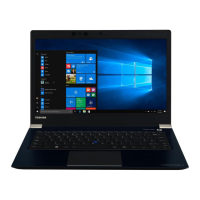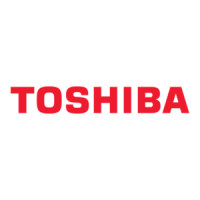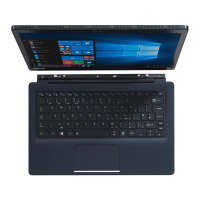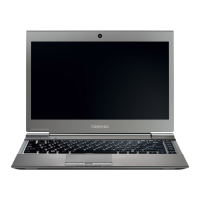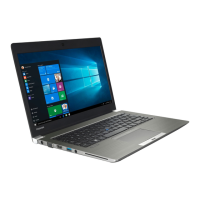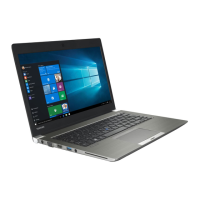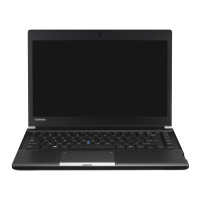Do you have a question about the Toshiba PORTEGE X20W-E and is the answer not in the manual?
Manual's copyright, disclaimer, and trademark information.
General regulatory compliance details for Toshiba computers.
FCC notice on device compliance and potential interference.
CE-Mark details and compliance with European directives.
Guidelines for proper disposal of products and batteries.
Essential safety precautions for using the computer.
Precautions to avoid heat-related injuries from computer contact.
List of included hardware and documentation items.
Steps and basic info for initial computer setup.
Detailed instructions for connecting the AC adaptor for power.
Procedure for turning on the computer for the first time.
Details on Windows Hello for secure sign-in using biometrics.
Procedures for safely shutting down or powering off the computer.
Explanation of Sleep Mode and precautions for its use.
Overview of system recovery options for restoring the computer.
Description of the computer's left side ports and indicators.
Description of the computer's right side ports and indicators.
Description of the computer's front view with display open.
Overview of the keyboard layout, keys, and indicators.
Details on the fingerprint sensor for authentication.
Explanation of power indicator lights and battery status.
Precautions and instructions for operating in tablet mode.
How to interact with the touch screen using gestures.
How to use the Touch Pad with gestures and functions.
Introduction to using the Stylus Pen for input and actions.
Instructions on how to charge the computer's battery.
Tips for extending the battery's operating time.
Overview of USB Type-C adapters and their uses.
Overview of audio control functions and video settings.
Introduction to the TOSHIBA configuration tool for system settings.
Using the eco Utility for power saving.
Information on USB charging features and modes for devices.
Setting up User and Supervisor passwords for computer security.
Introduction to the BIOS setup utility for viewing and changing settings.
Overview of unique or advanced computer features for enhanced convenience.
Guidelines for diagnosing and resolving computer problems.
Questions to identify the root cause of a computer problem.
Troubleshooting common software-related issues.
Troubleshooting common hardware-related issues.
Troubleshooting steps for a computer that fails to start.
Procedure for addressing automatic shutdowns due to overheating.
Troubleshooting common battery charging and power issues.
Information on how to get additional technical assistance from TOSHIBA.
Summary of the computer's technical specifications.
Electrical power requirements for the computer and adaptor.
General info and interoperability for wireless devices.
Introduction to Intel Active Management Technology (AMT).
Factors affecting battery life and replacement info.
| Operating System | Windows 10 Pro |
|---|---|
| Graphics | Intel HD Graphics 620 |
| Display | 12.5-inch, 1920 x 1080 pixels |
| Storage | Up to 512GB SSD |
| Weight | 1.1 kg |
| Ports | USB 3.0, USB-C, HDMI, microSD card slot, headphone/mic combo jack |
| Wireless | Wi-Fi 802.11ac, Bluetooth 4.2 |

